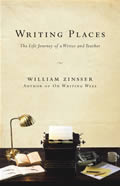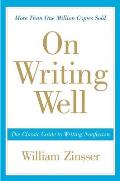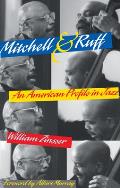
Hello again, Powellites.
Yesterday's blog was the first one I've ever attempted, written at the age of 86. I've never even
seen a blog. The vast blogosphere is a universe as unexplored by me as the far side of the moon. My needs as a writer are simple, little changed over the years: a computer, a Webster's dictionary, a telephone that's plugged into a jack and stays on my desk. No cellphone. No e-mail; I don't need it for my work and I don't want to spend my life checking for messages. I get people to call me on the phone and actually talk to me. Those calls have brought me many friendships and much to think about. Readers who feel that they know me from my book
On Writing Well often call with a question about writing, and I find myself drawn into lives I wouldn't otherwise know about. Last winter a woman named Fatima Al-Rasheed called from Kuwait with a writing problem that had her stymied. Could she come and see me? I told her it was her nickel, or dinar, and a few weeks later she was in my office, bearing a gift of dates packed in a sumptuous mahogany box.
My office is also a safe haven for present and former students. For many years I've taught an adult night course in memoir writing at the New School, and at the end I always say, "Once I have a student, I have that student forever." I also teach foreign students at the Columbia School of Journalism who need help writing clear and simple English, which is their second and often their third or fourth language. I'm the doctor they get sent to see. I'm not part of the school's formal structure of judging and grading; my only agenda is to be helpful, and I enjoy seeing my fledglings turn up at the door, enormously likable young men and women from every corner of the world — Bhutan, Uzbekhistan, Ethiopia, Sierra Leone, Thailand, Colombia, China. Sitting at a table next to my window, hunched over their gallant efforts to subdue the English language, we occasionally come up for air and take spiritual nourishment from the synagogue across the street, or from the framed photograph on my wall of the 77-year-old E. B. White writing in his small boathouse in Maine, his only tools a crude writing table and bench, a manual typewriter, some paper, and a nail keg for throwing away all the sentences that didn't come out right the first time, or the fifth time, or the tenth.
 Many younger writers have taken me as a mentor and have in turn become mentors to me. One of them, John S. Rosenberg, editor of Harvard Magazine, was a student in the writing course I taught at Yale in the 1970s that would grow into my book On Writing Well. John has long been my unofficial editor. I send him the chapters of my books-in-progress and I call him when I need advice or encouragement. He knows what I'm trying to do, and knows when I'm not doing it. The child is father to the man.
Many younger writers have taken me as a mentor and have in turn become mentors to me. One of them, John S. Rosenberg, editor of Harvard Magazine, was a student in the writing course I taught at Yale in the 1970s that would grow into my book On Writing Well. John has long been my unofficial editor. I send him the chapters of my books-in-progress and I call him when I need advice or encouragement. He knows what I'm trying to do, and knows when I'm not doing it. The child is father to the man.
(My office at Yale, incidentally, was one of the oddest of my writing spaces. My typewriter and I were directly beneath the 44-bell carillon in Harkness Tower, and if I had one bit of advice today for writers roaming the blogosphere it would be: Do not try to write under a 44-bell carillon.)
Another young mentor is Douglas Goetsch, a fine poet and an exceptional teacher of poetry in high schools and prison schools. We first met many years ago when he invited me to New York's great Stuyvesant High School to meet with his class, and he has since been a careful student of my work, tuned to currents of emotion that I wasn't aware of. Doug is my Buddhist guru. I also have a Jewish guru, Dr. Henry Seiden, a psychotherapist and poet, who studies my work just as carefully and, taking his cues from Dr. Freud, reaches the same conclusions.
 Yesterday Doug called from the University of Central Oklahoma, where he has spent a year as a teaching poet, to read me a passage he found in a book of aphorisms by an Egyptian writer, Yahia Lababidi, called Signposts to Elsewhere, which says: "The magician who begins to believe his own magic ceases to enthrall." Doug said, "You've never believed your own magic. What you put into your books isn't anything like what your readers get out of it. For you it's just the farmer tilling his field every day."
Yesterday Doug called from the University of Central Oklahoma, where he has spent a year as a teaching poet, to read me a passage he found in a book of aphorisms by an Egyptian writer, Yahia Lababidi, called Signposts to Elsewhere, which says: "The magician who begins to believe his own magic ceases to enthrall." Doug said, "You've never believed your own magic. What you put into your books isn't anything like what your readers get out of it. For you it's just the farmer tilling his field every day."
I claim not have to have much of an interior life. I tell Henry Seiden, the psychotherapist, that I'm probably the only person in his experience who is working from external evidence. My interest is in people — the infinitely surprising things they do and say and think — and my pleasure is to make a narrative arrangement of what I find. Many of my books — about the jazz musicians Dwike Mitchell and Willie Ruff (Mitchell & Ruff), about America's great iconic sites like Mount Rushmore (American Places), about the Florida baseball camp of the Pittsburgh Pirates (Spring Training) — turned out to have a high emotional content. That always came as a surprise to me. I thouht I was just fitting words together, telling people's stories — and my own.